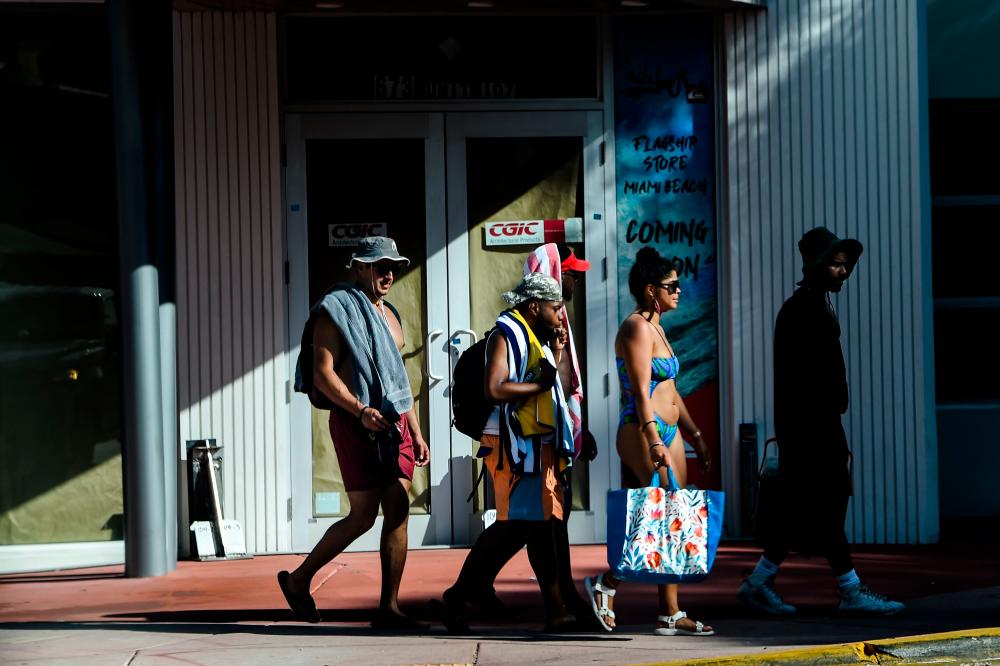MIAMI: The US state of Florida posted a record 10,000 new coronavirus cases on Thursday as an acceleration of the deadly pandemic across the Americas undercut fragile gains in other regions.
With Europe looking to turn the page on the biggest public health crisis in modern history - or its first wave, at least - cases have been skyrocketing across Latin America, contributing to a record global infection rate.
Brazil has almost 1.5 million confirmed cases, placing it second only to the United States, the epicenter of the pandemic, which is expected to record its three millionth infection next week.
Touching almost every country on Earth, Covid-19 - the disease brought on by the virus - has hit at least 10.7 million people and killed 516,000 globally, shattering previously buoyant economies and bringing public life to a standstill.
Yet while much of the planet pursued a return to some semblance of normality the United States soared past 50,000 new infections in one day for the first time on Wednesday, casting a grim pall over its upcoming Independence Day celebrations.
Florida is a key focus of public health experts worried about a surge in southern and western US states and it now has more than 169,000 cases.
Governor Ron DeSantis blamed the rise on “social interactions” among young people gathering at parties, beaches, bars, swimming pools and elsewhere, as well as a more “robust” testing program.
In Texas, where more than 2,500 people have died, Governor Greg Abbott ordered people in counties with 20 or more cases to wear masks and banned gatherings of more than 10 people.
The move came after the Lone Star State reported 8,000 new cases on Wednesday, the latest in a string of records that has alarmed health authorities, and led to the governor largely halting the reopening program that started in early May.
The developments are part of a pattern that has led to rising cases in almost every state - led by those that reopened their economies the earliest and the most quickly, against the advice of federal health authorities.
‘Roaring back’
Florida and other so-called “Sun Belt” states have been forced to re-shut restaurants, bars and beaches as the nation braces for the July 4 weekend.
These include California, which has seen a 56 percent increase in hospitalizations over two weeks, Governor Gavin Newsom said in a news conference.
But President Donald Trump, under fire for his handling of a crisis that has killed some 128,000 Americans, highlighted positive jobs data that showed 4.8 million people were back to work in June.
“Today’s announcement proves that our economy is roaring back,“ said Trump. “The crisis is being handled.”
The president’s characteristically optimistic outlook came a day after Arizona - population 7.3 million - recorded more new cases and deaths than the entire European Union, which has 446 million citizens.
But with some American governors now imposing 14-day quarantines on visitors from harder-hit states, the EU has begun reopening its borders. Residents of the US, Brazil and virus-ravaged Russia are still being denied entry.
The World Health Organization warned on Wednesday that the pandemic was accelerating, with more than half of the world’s infections over the past half year recorded in June alone.
And the past week has seen new highs with cases topping “160,000 on every single day,“ WHO chief Tedros Adhanom Ghebreyesus said.
Despite new infections and deaths showing no sign of slowing in Brazil, popular tourist city Rio de Janeiro authorized bars, restaurants and cafes to reopen to 50 percent capacity.
The country’s “R number” - the average amount of people to whom the infected will pass the virus - was one a month ago but has since risen to 1.5.
“That number will increase even more with reopening, bringing health problems to our population,“ Roberto Medronho, director of research at Rio’s Clementino Fraga Filho University Hospital, told AFP.
Brazil’s grim toll passed 60,000 dead on Wednesday, with 1.44 million infections. Colombia, the fourth largest economy in the region, passed 100,000 cases while Peru topped 10,000 dead.
Djokovic negative
Indigenous people across Latin America have been particularly hard hit due to weakened immune systems and centuries of state neglect.
The Pan American Health Organization estimates that at least 20,000 people are infected in the Amazon River basin, where some areas are only accessible by boat.
The health body has also warned that the death toll in Latin America and the Caribbean could quadruple to more than 400,000 by October without stricter public health measures.
In Europe, countries are trying to safely revive a struggling tourism sector by opening borders to 15 countries ranging from Algeria to Uruguay.
Travelers from China, where the virus first emerged late last year, will also be allowed to enter the EU if Beijing reciprocates.
Switzerland announced it would allow an anti-viral drug used to treat Ebola, remdesivir, to be given to Covid-19 patients.
Outside the EU, poor countries in the Western Balkans which have so far been spared the worst of the virus are now seeing a new rise in cases.
After holding national elections and sporting events throughout June, Serbia on Thursday announced new restrictions on gatherings of more than five people in its four hardest-hit towns.
The country’s world number one tennis player Novak Djokovic, meanwhile announced he and his wife had tested negative for Covid-19 after catching an infection at a controversial tournament he organized in the region.
Other parts of the world are also struggling with new clusters of contagion.
In the Middle East, deaths in Iran surpassed 11,000 on Thursday as the country records a rise in fatalities and cases following a low in early May. — AFP















